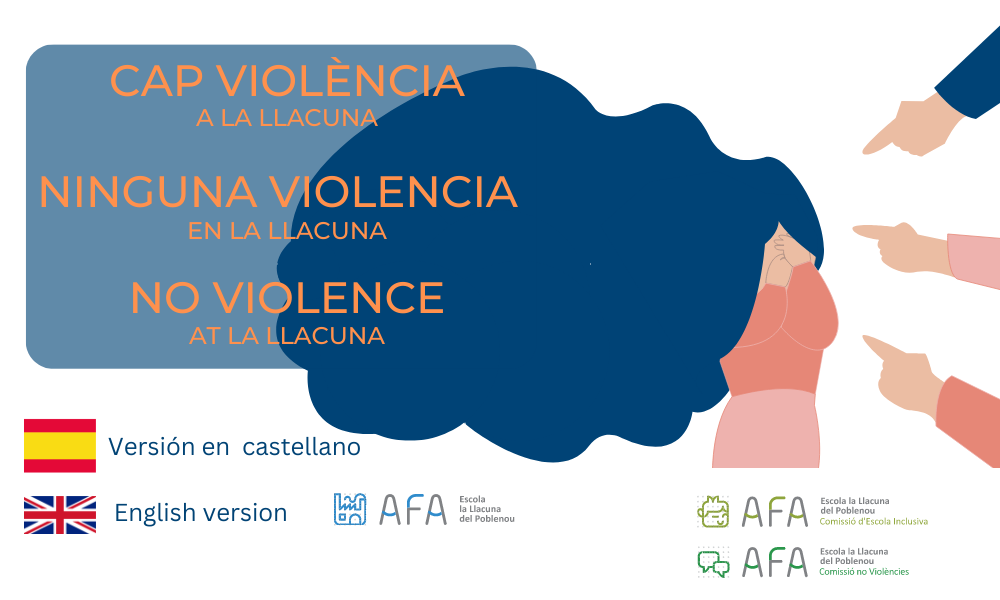
29 maig “La Llacuna lliure de violències”: tríptic en castellà i anglès
 LA LLACUNA LIBRE DE VIOLENCIAS.
LA LLACUNA LIBRE DE VIOLENCIAS.
La violencia, implícita en nuestra sociedad,genera dinámicas de desequilibrio de fuerzas y desigualdad.
La Convención sobre los Derechos de los Niños dice que todos los niños/as tienen derecho a la educación y a que la escuela sea un lugar seguro donde puedan desarrollar su personalidad, aptitudes y capacidades al máximo.
Las escuelas han de ser seguras, libres de cualquier forma de violencia física y/o psicológica para garantizar su función educativa.
Ante las violencias en nuestra escuela, ¡TENEMOS QUE ACTUAR todas y todos!
La violencia y la discriminación son comunes. Negarlas es el primer paso para normalizarlas.
TIPOS DE VIOLENCIA Y DISCRIMINACIÓN QUE ES NECESARIO CONOCER.
- Violencia machista.
- Maltrato a la infancia i/o a la adolescencia.
- Violencias LGTBI fobicas o Transfobicas.
- Conductas de odio y discriminación.
- Violencias sexuales.
- Acoso.
- Ciberacoso.
- Capacitismo.
¿Qué se el acoso escolar o bullying?
- El acoso escolar es cualquier tipo de maltrato psicológico, verbal o físico entre iguales de forma reiterada en el tiempo, tanto en el entorno escolar como fuera de él.
- Se puede producir tanto de manera personal como digital.
- Es una dinámica grupal, donde existe un desequilibrio de fuerzas (las personas que la ejercen tienen más fuerza física, psicológica o social o por la reiteración acaban teniéndola), y con una intencionalidad de herir al otro.
- Las conductas violentas en estos casos son: 90% verbales, sociales y psicológicas y 10% físicas.
CLAVES PARA DETECTAR UNA SITUACIÓN DE VIOLENCIA.
El menor que sufre :
- Lo puede verbalizar o no.
- Experimenta cambios de humor e irritabilidad.
- Se muestra triste y apático/a.
- Baja el rendimiento académico.
- Experimentas cambios en el ritmo del sueño.
- Cambios físicos, de postura corporal y de manera de vestir.
- Empieza a decir que no quiere ir a la escuela.
¿Qué podemos hacer como familias?:
- Observar las señales.
- Validar el sentimientos de nuestras hijas e hijos y ACTUAR!
- Hablar con los referentes adultos del niño/a en la escuela.
- Llevar un registro escrito del que explica (diario) y hacer seguimiento con la escuela.
- Ayudarle a conectar con sus recursos y Planificar juntos acciones y estrategias.
- Buscar apoyo psicológico externo, si hace falta.
- Hacer red*: preguntar al entorno, buscar alianzas y pedir ayuda.
- Tanto como familias de las personas que ejercen la agresión o como testigos, somos agentes implicados y hemos de actuar.
- Existen otros recursos especializados como UsApps que te darán un soporte más especializado.
AFA. * ¿Sabías que en el AFA hay una Comisión que se llama Escuelas Libres de Violencias?
Qué hacemos: Te ayudamos a actuar. Acompañamos a las familias ofreciendo soporte, formación y talleres, información sobre protocolos y canales disponibles, tanto por parte de las administraciones como por parte de otras organizaciones.
Contacto: noviolencies@afalallacuna.cat
¿HAS OÍDO HABLAR DEL CAPACITISMO?
El capacitismo es un prejuicio basado en la capacidad. És la suposición de que las personas sin discapacidades son la norma en la sociedad, y que las personas con diversidad funcional han de adaptarse a la norma o excluirse del sistema social.
EJEMPLOS DE CAPACITISMO:
– Subestimar las habilidades de una persona con necesidades educativas especiales, puede constituir una humillación, especialmente cuando se trata de una discapacidad “invisible” (casos de TEA, trastornos del espectro autista).
– Utilizar palabras asociadas con la diferencia como un insulto, como una cosa negativa o para hacer chistes: retrasado, cojo,loco, idiota, esquizo, autista, lisiado, etc.
El masking es una estrategia a menudo inconsciente o innata de supervivencia social. Se trata de enmascarar la propia identidad y de tener que fingir ser una persona diferente o bien reprimir u ocultar algunos comportamientos. Esto supone un desgaste importante y un sufrimiento extra, que puede desencadenar ansiedad y/o depresión.
Si quieres más información puedes contacta con la Comisión Inclusiva:
 LLACUNA FREE OF VIOLENCE
LLACUNA FREE OF VIOLENCE
Violence, something implicit in our society, generates a power imbalance and inequality.
The Convention on the Rights of the Child states that children have the right to education and for their school to be a safe place where they can develop their personality, aptitudes, and skills to the highest level.
Schools must be safe places that are free from any form of physical and/or psychological violence, to guarantee their educational role.
Our school MUST TAKE ACTION against violence.
Violence and discrimination in the classroom are common.
Denying it happens is the first step to normalizing it.
TYPES OF VIOLENCE YOU NEED TO BE AWARE OF:
- Gender-based violence
- Abuse of children and/or adolescents
- LGTB-phobic and transphobic violence
- Acts of hate and discrimination
- Sexual violence
- Bullying
- Cyberbullying
- Ableism
WHAT IS SCHOOL BULLYING?
School bullying is any type of psychological, verbal or physical abuse between peers that is repeated over time, both in school and out of school.
It can happen in person or electronically (social networks, apps, etc.).
It is a group dynamic, where there is an imbalance of power (those who bully others are stronger physically, psychologically or socially, or they become so after repeated action), and the aim is to intentionally hurt someone.
These violent behaviors are: 90% verbal, social and psychological, 10% physical.
SIGNS FOR DETECTING VIOLENCE
A child suffering from violence:
- May or may not talk about it.
- Experiences mood swings or irritability.
- Is sad and apathetic.
- Starts to struggle at school work and lowers their school performance.
- Experiences changes in their sleep patterns.
- Shows physical changes, such as in their posture and the way they dress.
- Starts to say they don’t want to go to school.
AS FAMILIES, WHAT CAN WE DO?
- Observe the signs.
- Validate the feelings of our children and take action..
- Speak to the relevant adults at the school.
- Keep a written record of what your child tells you (diary) and follow up with the school.
- Help your child to access their resources and plan actions and strategies with them.
- Find external psychological support, if necessary.
- Create a network*: ask around, find alliances and ask for help.
- Remember that if we are the families of people who are aggressive and/or who are witnesses to acts of violence, we are parties involved and we have to take action..
- There are other resources such as UsApps that give specialized support.
AFA *Did you know that the AFA has a Commission called Schools Free of Violence?
What we do: We help you take action. We stand by you and give you support, courses and workshops, information on protocols and channels that are available to you, both from the authorities and from other organizations.
HAVE YOU EVER HEARD OF ABLEISM?
Ableism is prejudice based on ability. It is the assumption that people without disability are the norm in our society, and people with functional divergence have to adapt to the norm or be excluded from the social system.
EXAMPLES OF ABLEISM:
– Underestimating the abilities of a person with special educational needs, which may lead to humiliation, especially when it is an “invisible” disability (such as Autism Spectrum Disorder, ASD).
– Using words associated with disabilities as an insult, as something hurtful or in jokes: lame, dumb, retarded, blind, deaf, idiot, imbecile, nuts, psycho, and spaz.
Masking is an often unconscious or innate strategy for social survival. It involves covering up your true identity and having to pretend to be a different person or suppressing or hiding some behaviors. It significantly wears a child down and leads to suffering that can trigger anxiety and/or depression.
For more information, you can contact the Commission for Inclusive Education:


